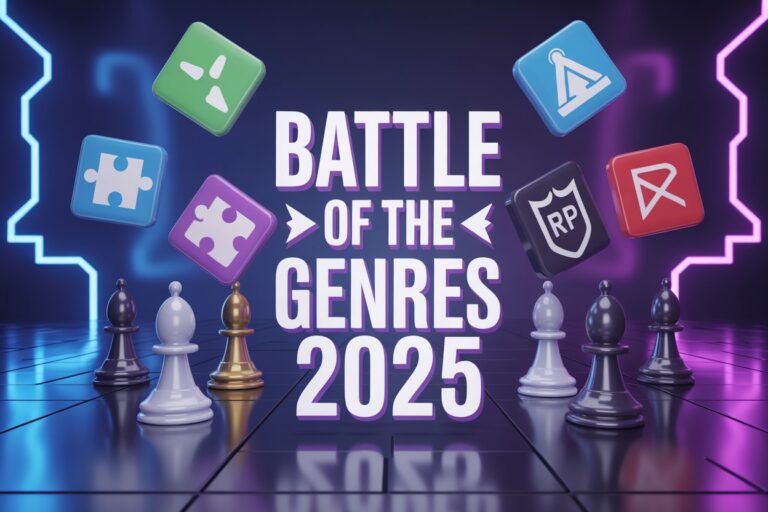In the ever-evolving landscape of digital entertainment, video games have established themselves as a cultural cornerstone. With technology advancing at a rapid pace, the diversity of game types available today is staggering. Whether you’re a casual player or a dedicated gamer, understanding the different types of digital games can enhance your gaming experience. In this blog post, we’ll dive into the major categories of digital games, each with its unique appeal and gameplay mechanics.
1. Action Games
Action games are all about fast-paced gameplay, quick reflexes, and dynamic challenges. They often focus on physical challenges and require players to exhibit hand-eye coordination, reaction time, and strategic planning. This category includes:
- Platformers: Games where players navigate characters through a series of levels filled with obstacles and enemies. Classic examples include Super Mario Bros. and Celeste.
- Shooters: Whether first-person (FPS) or third-person (TPS), shooters emphasize combat through firearms or other weapons. Notable examples are Call of Duty and Gears of War.
- Beat ’em Ups: These games involve fighting multiple enemies in close combat. Streets of Rage and Castle Crashers are popular titles in this genre.
2. Adventure Games
Adventure games prioritize storytelling and exploration over fast reflexes and action. They often involve puzzles, narrative choices, and intricate worlds to discover. Key sub-genres include:
- Point-and-Click Adventures: Players interact with the environment and solve puzzles through a point-and-click interface. Monkey Island and Grim Fandango are classics in this genre.
- Visual Novels: These games are heavily narrative-driven, often resembling interactive books. Doki Doki Literature Club and Phoenix Wright: Ace Attorney exemplify this type.
3. Role-Playing Games (RPGs)
RPGs are known for their deep narratives, character development, and immersive worlds. Players typically take on the roles of characters with unique abilities and embark on quests. RPGs can be divided into:
- Traditional RPGs: These include turn-based combat and extensive character customization. Final Fantasy and The Elder Scrolls series are prominent examples.
- Action RPGs: Combines elements of action games with RPG mechanics, such as real-time combat and skill progression. The Witcher 3: Wild Hunt and Dark Souls are popular titles.
4. Simulation Games
Simulation games mimic real-world activities or systems, offering players a sandbox to experiment and manage different scenarios. This genre includes:
- Life Simulators: Games that let players experience and manage various aspects of life. The Sims series is the quintessential example.
- Management Simulators: Focused on managing resources, organizations, or businesses. Stardew Valley and Cities: Skylines are well-regarded in this category.
5. Strategy Games
Strategy games challenge players to make tactical decisions and plan their moves carefully. They can be:
- Real-Time Strategy (RTS): Players manage resources and command units in real-time. StarCraft and Age of Empires are iconic examples.
- Turn-Based Strategy (TBS): Players take turns making decisions and moves. Civilization and XCOM are notable entries in this genre.
6. Sports and Racing Games
These games simulate real-world sports and racing experiences, allowing players to engage in competitive gameplay. They include:
- Sports Games: Cover a range of athletic activities, from soccer to basketball. FIFA and NBA 2K are leading titles in this genre.
- Racing Games: Focus on vehicle-based racing, offering realistic or arcade-style driving experiences. Gran Turismo and Mario Kart are popular choices.
7. Puzzle Games
Puzzle games emphasize problem-solving and critical thinking. They often feature challenges that require logic, pattern recognition, and creativity. Examples include:
- Logic Puzzles: Games that involve solving complex problems and riddles. Tetris and The Witness are great examples.
- Casual Puzzles: Games designed for quick, accessible play, often with simple mechanics. Candy Crush Saga and Bejeweled fall into this category.
8. Horror Games
Horror games aim to induce fear and tension, often through atmospheric design, unsettling soundtracks, and psychological challenges. Popular titles include:
- Survival Horror: Focuses on managing limited resources while facing terrifying enemies. Resident Evil and Silent Hill are classics.
- Psychological Horror: Emphasizes mental and emotional disturbances. Amnesia: The Dark Descent and Outlast are notable entries.







